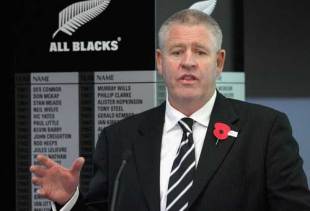|
International Rugby
New broadcast deal boosts SANZAR
Scrum.com
April 22, 2010

SANZAR and NZRU chief executive Steve Tew has welcomed the lucrative deal
© Getty Images
Enlarge
Australian, New Zealand and South African officials have hailed the new five-year US$437 million broadcast deal for international Test and Super rugby that will ease the financial pressure on the southern hemisphere nations' governing bodies. SANZAR revealed details of the new broadcast rights package on Thursday, which is set to grow further once more agreements are reached to beam Tests, Tri-Nations and Super 15 matches into other international markets including Asian, North American and European countries. The deal, which commences in 2011, has been rebuilt from the ground up to suit the evolving nature of the game in the southern hemisphere. With the introduction of Melbourne Rebels to the new Super 15 next season, the competition will take on a conference-based structure featuring more matches and many more local derbies. For the first time, each of the three SANZAR nations have negotiated their own domestic broadcast deals instead of bundling their entire product together, as was done previously. The result is the US$437 million collective windfall, an increase of US$114m, or 35 percent, on the soon-to-expire five-year deal with News Corp. Sky Television (New Zealand), Supersport (South Africa) and Fox Sports (Australia) will take on the broadcast rights in each nation. The Nine Network will carry free-to-air rights in Australia. While the exact split of revenues between the three nations hasn't been revealed, the Australian Rugby Union (ARU) said it would receive a 30 percent increase on its previous income and the New Zealand Rugby Union (NZRU) said it would get 28 percent more than previously. By logic, that would imply the South African Rugby Union (SARU) would receive the biggest percentage benefit given the overall 35 percent boost. SANZAR and NZRU chief executive Steve Tew welcomed the deal on a day the NZRU announced a NZ$15.9 million loss for the 2009 financial year. "It is better than the range we started with, we're pleased with what we've got," Tew said. "It means we have a significant chunk of our income secured for the next five years. Cash reserves won't be called on to any large degree for that period of time. The fact that we sold in a pretty difficult commercial climate and the fact that we've got two World Cups (2011 and 2015) that drop down the number of games, the figures are very positive." Tew said the deal was even better considering the NZRU had already sold its domestic provincial championship as a separate entity to Sky Television. "Previously all the competitions have been lumped into one fund and then divided among the unions as they agree," he said. "From this deal onwards, we keep the revenue that comes for our domestic competitions and Australia and South Africa will do the same. So you benefit more directly from the growth of your own competition." ARU chief executive John O'Neill said the new deal represented the upwards trend of rugby, particularly in a challenging Australian market where a number of sports compete fiercely for interest and revenues. "These are encouraging times for the game. We came through a difficult financial period that affected sports and businesses across the globe and have subsequently emerged with a superior broadcast deal to the previous two in place from 1996 and 2006," he said. South African Rugby Union manager of national teams Andy Marinos was pleased with how his country emerged from the deal. "A more sophisticated approach to the allocation of rights as well as the retention of archive rights was achieved to ensure additional value for SANZAR on which to grow and expand the competitions," Marinos said. © Scrum.com
|
Live Sports
Communication error please reload the page.
-
Football
-
Cricket
-
Rugby
-
- Days
- Hrs
- Mins
- Secs
F1 - Abu Dhabi GP
Abu Dhabi Grand Prix December 11-131. Max Verstappen ()
2. Valtteri Bottas (Mercedes)
3. Lewis Hamilton (Mercedes)
4. Alexander Albon ()
5. Lando Norris ()
6. Carlos Sainz Jr ()
-
ESPNOtherLive >>
Snooker - China Open
Tennis - Miami Open

